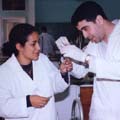 |
 |
||||||||||||||||||||||
|
 |
 |
 |
||||||||||||||||||||
|
Professor Emeritus: A. Bishay Desert Technology: A. Belal (Tissue Culture), M. Ebeid (Desert Housing), S. Fath-Allah (Farm Mechanization), S. El Haggar (Engineering), S. Ismael (Farm Irrigation Systems), M. Sabbah (Agricultural & Post-Harvest Engineering) Desert Community: M. El-Amir (Socioeconomics, Training), A. Al-Bendary (Gender Issues), D. Cole (Anthropology), M. Nawar (Rural Sociology) The AUC Desert Development Center (DDC) was established in 1979. The DDC's mission is to "improve the social and economic well-being of new desert settlers, through the use of research, training and related activities which integrate among agriculture, renewable energy and community aspects in order to achieve sustainability through increased productivity, profitability, diversity of output and conservation of natural resources." DDC has adopted three major strategic issues: a. Water-use efficiency under different desert farming systems. b. Environmental impacts of desert developmental activities. c. Training of current and potential desert farmers. For more information please refer to DDC website at Http://www.aucegypt.edu/graduates/DDC Research Projects Major research projects have been undertaken in the following areas: desert farming systems for improving productivity of desert sandy soils; fodder, food, and horticulture crops; windbreaks and multipurpose trees for desert agroforestry systems; plant tissue culture for cloning of selected forestry and horticulture trees; alternative fodder and feeding systems; sheep and cattle research for meat and milk production; water-use efficiency; applications of renewable energy for desert development (solar, wind, and biogas); desert housing based on passive solar architecture; small-scale solar pumping; low-pressure irrigation, water and energy constraints, socio-economic monitoring and evaluation of on-site and on-farm demonstrations as well as the identification of problems that face desert settlers and suggesting solutions for these problems, e.g. marketing and availability and quality of agricultural inputs. The DDC accepts national and international post-graduate students to carry out part of their research using its facilities, provided that the topics fit the DDC mandate. Collaborative R & D with the Private Sector If DDC's progress is to be accelerated, it has to become directly involved in community development programs, making use of the long experience it has acquired throughout the years. Producing high quality fruit budlings and cutlings (Seedlings) adaptable to desert conditions is among the effective means for desert agricultural development in Egypt. In this context, DDC is formulating an agreement with a private company to conduct a research and development program through transfer of technology and experience. DDC has had an agreement of collaboration with the Agha Khan Foundation to assist in the propagation of ornamentals needed for the establishment of the National Azhar Park in Cairo. Training at DDC Short training programs have been developed by DDC since 1986 covering basic concepts of desert agriculture and technology, renewable energy and socio-economic aspects of farming systems. The DDC hosts a series of seminars every year to present and debate its findings, and publishes the "Desert Development Digest" quarterly to serve as a forum for issues related to the desert and its development. Cooperative Effort The DDC has established cooperative relationships with experts and research institutions for assistance in applied research, training, and demonstration activities. These include the Ministry of Housing and New Communities; the Ministry of Agriculture and Land Reclamation and its Agricultural Research Center; the Ministry of Electricity and Energy; the National Research Center; the University of Alexandria; the University of Arizona; North Carolina State University; Texas Tech University (ICASALS); and a number of experts from the National Faculties of Agriculture and Engineering of Cairo, Alexandria, Ain Shams, Tanta, and Zagazig universities.
|
|||||||||||||||||||||||
|
Last Updated December, 2000 |
|||
|
Copyright © 2000-2001, The American University in Cairo |
|||